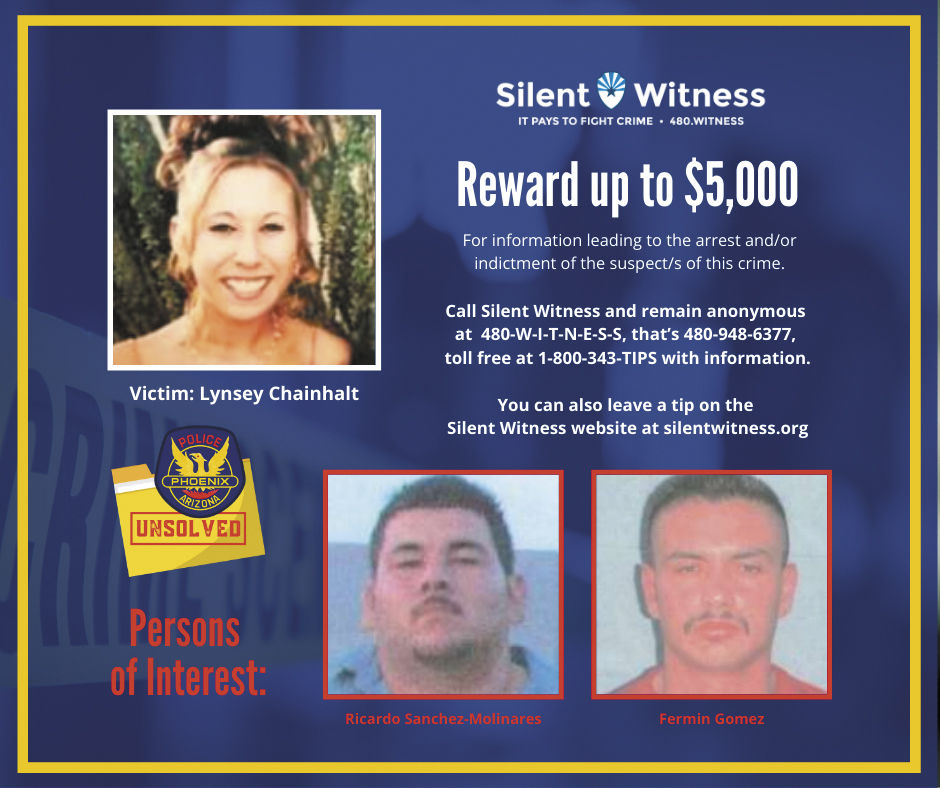By Jenna-Lee Neff
One of the few crimes without a statute of limitations is a homicide. But time proves to be the enemy in many investigations, leading to a growing queue of cold cases. A new initiative by the Phoenix Police Department seeks to bring those cases back to the spotlight.
“We want the community to understand that a homicide is never closed until it is solved,” explains Phoenix Police Sergeant Tommy Thompson. “Until that happens, the victims and their loved ones won’t have peace.”
“Hot Desert, Cold Cases” brings cases handled by the Phoenix Police Cold Case Homicide Unit back to the community eye through short, informational episodes designed to jog the memory of viewers for potential leads. These videos and accompanying case information are also being shared on the department’s other social media profiles.
“Getting attention out about the cases is important,” Thompson shares. “There may be witnesses who obtained information first, second, third or even forth hand. Someone may have heard someone talking about someone who heard someone talking.”
Thompson shares that the department recently solved a cold case from 1978, and while victims’ families, former officers, and detectives on the case may have passed away, it is still important to try to put these cases to rest.
Due to the COVID-19 pandemic, people are spending more time at home, giving crime enthusiasts and even the general community the opportunity to dig in on older cases with fresh eyes. Thompson encourages people to not only look at “Hot Deserts, Cold Cases” but to also visit the Silent Witness website to view other cases.
“I can envision people at home becoming super sleuths to try and solve the cases,” he says. “…Despite our best efforts, it is very difficult to solve a homicide without the community. We need their help.”
Getting information out about the cases not only help solve the crime but also lets the victims’ loved ones know that the case has not been forgotten.
“We want the families of the victims to know we never give up on the cases involving their loved ones,” Thompson says.
The first case featured in the initiative is the murder of Lynsey Chainhalt on June 13, 2003.
The 20-year-old was the designated driver, taking herself and three friends home after attending a party in the East Valley.
Retired Phoenix Police Detective William Schira, who spent the final 8.5 years of his career on the case, explained the events of the evening.
“As they were going northbound on I-17, somebody in a dark-colored Tahoe or Blazer threw a beer bottle at them,” he says.
The suspect’s car then followed Chainhalt to the area of 20th Street and Grovers where three Hispanic men got out and fired 19 rounds into the car, killing Chainhalt and injuring her friends.
Suspects fled the scene and, aside from the other passengers in Chainhalt’s car, there are no known witnesses. Her friends were unable to identify the shooters and numerous leads have been followed by Phoenix police, but none have provided a break in the case.
“Even though I’ve been retired 3.5 years, I still think about this case,” Schira says. “Especially on the anniversary dates.”
Chainhalt’s mother, Judi Petersen, describes her as smart, determined, a tried-and-true friend with a great heart. She hopes that even though years have passed, someone will come forward with information to finally bring peace to the case.
“I just don’t know how, if you had any knowledge of something like this, something so brutal, four people, four kids… how you could keep that in for the remainder of your life,” Petersen says. “How do you do that?”
There are two persons of interest in the case – Ricardo Sanchez-Molinares, also known as Butcho, and Fermin Gomez, also known as Mini. Both were mentioned in interviews pertaining to the case, and it is suspected that they traveled to Mexico after the murder.
Chainhalt’s case has been featured several times in the Valley in recent years in attempts to get justice for Chainhalt’s family and her friends in the car that night.
“She was worthy, she deserved a chance in life,” Petersen says. “She would have done good things.”
Readers can keep up on the latest “Hot Desert, Cold Cases” episodes by following the Phoenix Police YouTube channel. If readers have any information regarding Lynsey Chainhalt or any other cold cases featured in the initiative, they are urged to contact Silent Witness at 480-Witness or leave an anonymous tip on the Silent Witness website, silentwitness.org. Tips are kept anonymous and there is potential for a cash reward.






